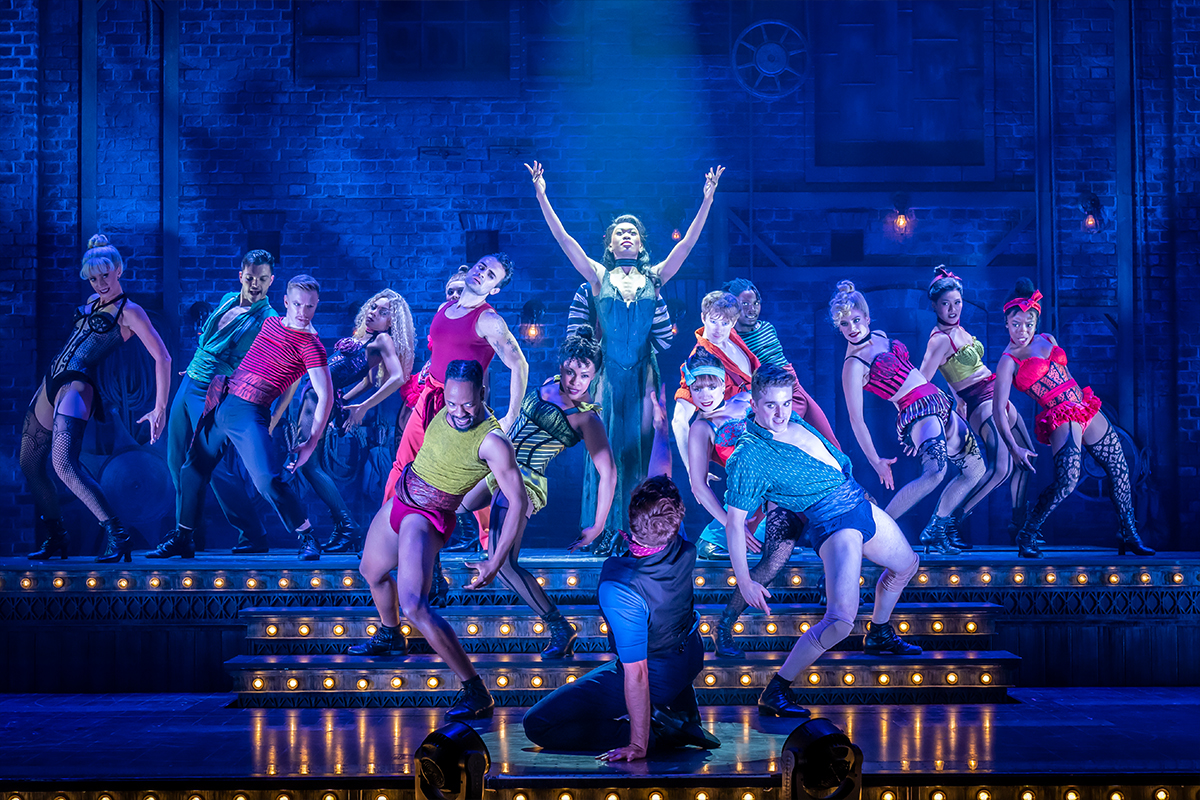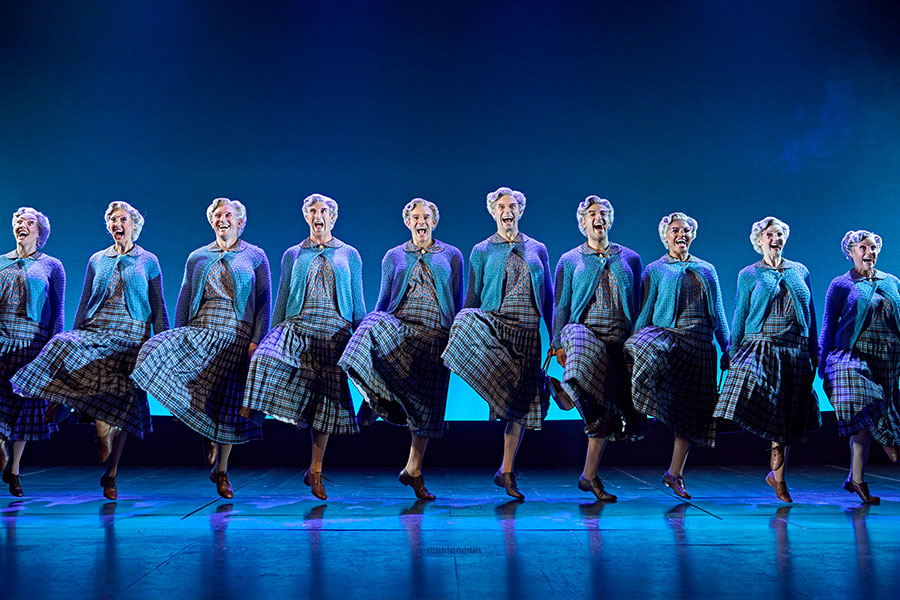Review Round-up: Churchill’s Girls Still On Top
Max Stafford-Clark‘s revival of Caryl Churchill‘s Top Girls transferred to London’s Trafalgar Studios last week (17 August 2011, previews from 5 August).
Having recently enjoyed success and critical acclaim at the Chichester Festival Theatre, Top Girls
stars Suranne Jones as Thatcherite career woman Marlene, who hosts a
dinner party for success women from history and art to celebrate her
promotion to director of Top Girls Recruitment Agency.
The all-female
cast also includes Stella Gonet as Marlene’s underachieving sister,
and Olivia Poulet as her frumpy niece, with dinner party guests
played by from Lucy Briers, Laura Elphinstone, Lisa Kerr and
Catherine McCormack.
The play runs at Trafalgar Studios until 29 October 2011.
Michael Coveney
Whatsonstage.com
★★★★★
“It’s
good to be reminded in this stunning Out of Joint production by the
play’s original director, Max Stafford-Clark, first seen at
Chichester in June, that its theatrical juice still flows unclogged by
reputation; Stafford-Clark directs as if the play had just landed in his
in-tray.
Structurally, Top Girls
is brilliant, radical and resonant: great women from
history…convene in a restaurant, La Primadonna, to celebrate
Marlene’s appointment as managing director of an employment
agency.
..
Stafford-Clark divides two scenes from the third,
which boils down to a sibling showdown, one year before, between Marlene
(the outstandingly soignée but still vulnerable Suranne
Jones) and Stella Gonet’s scrubbed, implacable, but worn
down Joyce, who’s raised Angie and stayed true, though not
necessarily out of choice, to her working-class origins.
I’ve
always loved and admired the play, but I had forgotten how ingeniously
it makes its effects and arguments. And of course we see it now in even
sharper relief in the march of history. “I think the 1980s are
going to be stupendous!” says Marlene, and she was right, by
her lights. But now look what happened. Top Girls is not so much historical pastoral as ironical satirical.
And
it’s beautifully acted here, not just by Jones and Gonet, but
also by Olivia Poulet as both a bovine Dull Gret and an aggressively
enthusiastic and muddled-up Angie, with delightful, pointed
contributions from Lucy Briers, Laura Elphinstone, Lisa Kerr and
Catherine McCormack. Great design, too, by Tim Shortall.”
Fiona Mountford
Evening Standard
★★★★
“How
wonderful to see the stage of a West End play filled entirely by women.
How sobering though that, 29 years after its Royal Court debut, this
feisty feminist polemic from Caryl Churchill should still elicit such
an opening comment in a review.
Churchill’s theatrically audacious,
unmistakably heartfelt drama takes the pulse of the sisterhood in the
age of Thatcher and is forced to conclude that some sisters are
considerably more equal than others. Tory prime ministers may change,
this luxuriously cast revival transferring in from Chichester seems to
say, but other things stay grimly the same.
Marlene (Suranne Jones)
has just been appointed MD of the Top Girls employment agency and to
celebrate has thrown the dinner party of one’s intellectual dreams.
…So
where have the centuries left us? Churchill doesn’t hesitate: in the
gap between the go-getting haves and the left-behind have-nots of early
Eighties Britain. Acts Two and Three pull us, in both location and
sympathy, between Marlene’s slick office, all big hair and
power-dressing, and the rural home of her estranged sister Joyce
(Stella Gonet), struggling with her educationally backward teenage
daughter Angie (Olivia Poulet).
Fine work from all seven actresses
keeps our emotions on the spin and director Max Stafford-Clark offers a
nuanced but fleet-footed production.
Lucy Briers makes a
deliciously straight-talking pontiff and Poulet transforms from a
comically monosyllabic dinner guest into the sort of girl history is
likely to forget. Top stuff.”
Reviews from the Chichester Festival Theatre….
Charles Spencer
Daily Telegraph
★★★★★
“I’m
a crusty old Tory while Caryl Churchill comes across as a pretty
hard-line socialist and feminist. So you might expect me to have hated
this revival of Top Girls.
In fact the play, first staged in 1982, strikes me as a modern classic.
It’s often splendidly funny and inventive, and, by the end,
deeply moving, too.
…It’s a wonderfully amusing
and disconcerting scene, directed with superb panache by Max
Stafford-Clark who was responsible for the play’s premiere
almost 30 years ago. The over-lapping conversations and the wit of much
of the dialogue is superbly caught, and you feel as if you are
eavesdropping on one of the most entertaining dinner parties you have
ever attended.
…The political arguments are strongly tied
to both character and dramatic situation and Stafford-Clark’s
witty yet deeply felt production brilliantly combines comic knockabout
with strong emotion and evocative period detail. Suranne Jones
captures the very essence of the pushy Eighties as Marlene, all padded
shoulders and ruthless drive. Stella Gonet is deeply affecting as her
harassed sister while Olivia Poulet movingly suggests a troubled,
disadvantaged teenager who will go under in the tough competitive
Eighties.
Most plays about Thatcher’s Britain were strident studies of social deprivation and blustering fury. In contrast Top Girls is oblique, witty, deeply felt and theatrically daring. I recommend it highly, even to reactionaries like me.”
Paul Taylor
Independent
★★★★
“…The
piece begins with an outrageously funny and disturbing tour de force
– a long, semi-absurdist scene in which Marlene (superb
Suranne Jones), a young working-class-made-good “career woman” and
Thatcherite individualist, celebrates her promotion…by hosting
a dinner at a swanky London restaurant for female figures from history
and art. These range from Pope Joan (portrayed with a lovely wit by
Lucy Briers), to Lady Nijo, a 13th-century Japanese concubine
(portrayed by an hilarious Catherine McCormack).
Max
Stafford-Clark‘s crack cast perform the scene with a wonderful mad
verve, bringing out all the comedy of incongruity as the different
cultural assumptions of the women thwack against each other at a social
event more associated with parties of bullish bankers.
In the
questions it raises about women and reproduction and success, this
episode also sets up the situation, explored with agonising realism in
later sections, whereby we learn that Marlene’s progress has been bought
at the expense of her illegitimate daughter (an emotionally famished
Olivia Poulet) who has been brought up as the child of her resentful
proletarian sister (excellent Stella Gonet). The climactic ding-dong
between the sisters is gut-wrenchingly well played here – the
recrimination and the muscle memory of intimacy, the bile and the blood
that is thicker than water, the sense that Marlene’s go-getting
individualism depends upon exploiting other women set against the
irritating defeatism of her sister. A classic play in a classic
production.”
Patrick Marmion
Daily Mail
★★★★★
“A
little piece of theatrical history is blowing through Chichester until
the end of next week. It is Max Stafford-Clark’s moving
revival of Caryl Churchill’s great 1982 play about the rise
of women in the workplace and the changing face of British society under
Mrs Thatcher.
Churchill’s genius was to tap into the ordinariness of people’s experience of economic and social change.
…The
great thing about the story is that it doesn’t take sides.
Churchill merely observes the dying of one era and the mewling emergence
of another.
Suranne Jones as the stridently ambitious Top Girls
boss Marlene, sums it up when she proudly exclaims: ‘I believe
in the individual!’
It’s hard to remember that
this now commonplace assertion was once capable of dividing families.
Stella Gonet is a withering critic as her countrified opposite number
Stafford-Clark
directs a touching production as impeccably cast as his original (which
starred Lindsay Duncan, Lesley Manville and Deborah Findlay).
Catherine
McCormack plays a Japanese concubine and a strident Top Girls employee
with vim. But the most significant supporting role is Olivia Poulet
as the ‘lazy and stupid’ teenager mesmerised by the
mother who rejected her.
The world would never be the same again.”










